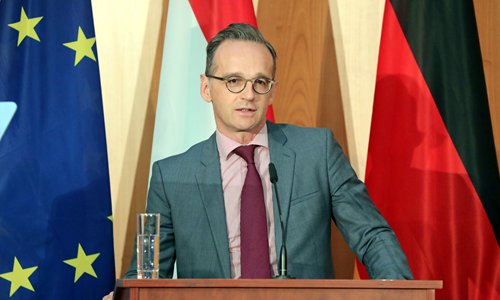HOME >> OPINION
Maas’ meeting with HK secessionist hurts German interests
Source:Global Times Published: 2019/9/11 20:08:40

Heiko Maas Photo: IC
Hong Kong secessionist Joshua Wong Chi-fung went to Berlin, where German Foreign Minister Heiko Maas met with him on Monday. China is firmly opposed to this. Wong is an extreme opposition figure in Hong Kong. He is also a secessionist. Senior officials of any country should not interfere in China's internal affairs by meeting him. This is Beijing's consistent attitude.
German Chancellor Angela Merkel was cautious about the Hong Kong problem during her visit to China last week. The German foreign minister's message was different from Merkel's, undermining the significance of the visit. Maas's behavior is that of a philistine. It does not promote the interests of Germany, it only harms them.
While China and Germany are focusing on development cooperation, Maas bowed to the pressure of public opinion and met a young man who sought to create chaos in Hong Kong. Such an opportunistic gesture will not bring glory to Germany.
On the one hand China needs to continue to press European countries against their officials making irresponsible remarks about Hong Kong. On the other hand, we need to support the HKSAR government in stabilizing the situation in Hong Kong and win the support of the majority of the residents to stop the violence. In Berlin, Wong said that if a new Cold War is starting, then Hong Kong is the new Berlin. We believe that most people in Hong Kong do not want their city to become the front line of a new Cold War, in which case the city will be inevitably torn apart and will never have peace. A few of the most extreme Hong Kong radicals have called on the US congress to pass legislation that threatens Hong Kong's future. A bill that would eliminate Hong Kong's special tariff status would not be welcomed by most Hong Kong citizens.
Things are still complicated in Hong Kong, where dissatisfaction among some Hong Kong people, radical demonstrators and extreme political opponents who want to profit off this is mixed. Outside, there is the US, which wants to use Hong Kong as a lever to disrupt and pressure China. Other Western countries have also chimed in.
Hong Kong is a part of China. It is a special administrative region under China's sovereignty where the People's Liberation Army (PLA) is stationed. Beijing holds all the cards regarding Hong Kong situation. Beijing's position is always the most authoritative in Hong Kong, which cannot be surpassed and shaken by any force.
The Hong Kong government has not caved in to the rioters. The police force has been loyal to its duty, which shows that "one country, two systems" is strong and Beijing's support has been very effective. Recently, the Hong Kong police force has become more resolute in its anti-violence and anti-riot operations. Although the rioters continue their crazy behavior, the number of people taking part in demonstrations has decreased significantly.
Hong Kong's prosperity is inseparable from the motherland. It is also inseparable from the rule of law and stability in Hong Kong. There are differences in values between Hong Kong and mainland societies, but that does not prevent Hong Kong from playing a unique role in the motherland and continuing to serve as a bridge between China and the West. As a bridge or a front line, Hong Kong will calmly choose the latter. There is no doubt about that.
There are limits to the ability of the US to intervene in Hong Kong. Germany is well aware of its influence in Hong Kong. The Maas' performance came after German Chancellor Merkel's visit to China. It's a classic show of careful calculation. It's not about morality but rather petty politics.
Who has the final say in Hong Kong affairs? It is not the power of the West and Berlin is even more unlikely.
RELATED ARTICLES:
Posted in: EDITORIAL